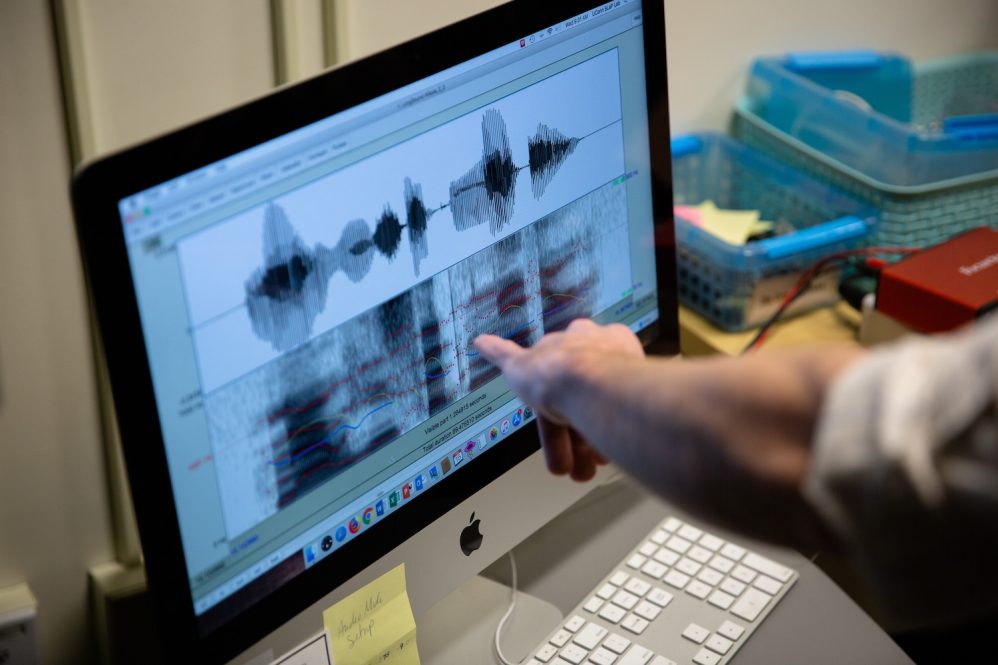Theodore is in the middle of a two-year stint as a program director at NSF in Washington, D.C.

Students in the UConn Laboratory for Spoken Language Processing (SLaP Lab) in the Phillips Communication Sciences Building on Feb. 15, 2023. (Bri Diaz/UConn Photo)
Over the past two decades, Rachel Theodore, an associate professor of speech, language, and hearing sciences, has worked to better grasp how people understand language.
Her work in her lab at UConn brings elements of communication sciences and disorders, linguistics, psychology, and cognitive science to explore how our environment influences language processing and why individuals show variation in language processing.
According to Theodore, tackling a topic as complex as human language requires an interdisciplinary approach.
"We cannot have a comprehensive scientific understanding of language 'in vivo,' of language as it operates in the world, without an interdisciplinary perspective," she says.
Now, Theodore is in the middle of a two-year stint as program director for the Linguistics and Dynamic Language Infrastructure – Documenting Endangered Language programs at the National Science Foundation (NSF). In this role, she says, she can help advance interdisciplinary approaches across her field and in the work of other researchers on a national level.
"Being at NSF is driven by the desire to contribute to the field beyond what I could do as an individual researcher in a lab," Theodore says. "It offers me a real opportunity to have input to shape and to serve language sciences at the national level."
Theodore joined UConn's Department of Speech, Language, and Hearing Sciences in 2011. She is an active contributor to the Cognitive Science Program and has an appointment in the Department of Psychological Sciences, where she advises Ph.D. students.
She believes interdisciplinary research is critical to address modern speech, language, and hearing issues because those challenges do not exist in a vacuum but intersect across a variety of disciplines.
The end goal of an interdisciplinary study of language sciences, she says, is a theory that can account for language in its diversity and complexity, including the different ways people use language as it occurs in the real world, and that is accomplished through a combination of work across linguistics, psychology, neuroscience, and clinical domains.
Theodore explains that linguistics helps researchers to understand the formal aspects of language systems. Psychology fosters the understanding of processes and representations in use. Neuroscience allows researchers to understand how biology interacts with language to impact a person's experience. Clinical domains support the understanding and treatment of language disorders, such as dyslexia or aphasia.
As a program director, Theodore reviews and provides feedback on proposals from researchers in these diverse fields seeking NSF funding. She looks for ways the projects advance core language science disciplines and how they could contribute to multidisciplinary efforts.
She also holds regular meetings with individual researchers to assist them with their funding proposals and frequently engages in NSF outreach efforts to larger audiences including professional organizations.
As part of her science policy efforts, Theodore works to ensure that research funded by NSF is accessible to the general public via a working group she collaborates on with colleague Marie Coppola, professor of psychological sciences and linguistics, and a 2024 American Association for the Advancement of Science (AAAS) Science & Technology Policy Fellow. She also works on post-award management of one of the 10 NSF Regional Innovation Engines, a new multisector program that fosters regional economic growth that was awarded $15 million earlier this year.
Theodore says her time at NSF has taught her that it is "imperative" for academic researchers to connect their work to society.
"Most of us [researchers] are not as good at that as we could be," she says. "Whatever direction my career takes moving forward, that is going to be a goal of mine, not just for my own work, but for helping the field see the reasons why we need to connect our work to the world."
Additionally, she has become even more resolute of the need to broaden participation in science. Theodore says once back at UConn, she hopes she can use what she has learned at NSF to help demystify NSF funding for other researchers, and help academics navigate federal open access policies and align their work to funding priorities that are rooted in society's needs.
"We as a scientific endeavor have so much more work to do to make sure that science is an inclusive space, including supporting investigators at lower resource institutions, investigators with disabilities - inclusive on all dimensions of diversity," she says. "We need more people doing this work."






